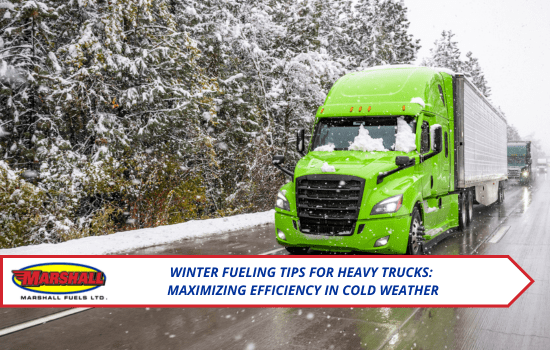Winter weather can impact fuel efficiency, making it crucial for truck drivers to adapt fueling strategies. Discover essential tips to keep your heavy truck running smoothly and efficiently, even in harsh winter conditions.
Cold Weather Fueling Tips: Boosting Efficiency for Heavy Trucks in Winter
 As winter approaches in Ontario, heavy truck drivers face unique challenges when it comes to fueling and maintaining efficiency. Cold weather can significantly impact fuel performance, leading to issues like fuel gelling, increased consumption, and even breakdowns. At Marshall Fuels & Truck Stop, we want to ensure that you are well-prepared for the winter months. Here are some best practices for fueling during winter to maximize efficiency and avoid cold-weather complications.
As winter approaches in Ontario, heavy truck drivers face unique challenges when it comes to fueling and maintaining efficiency. Cold weather can significantly impact fuel performance, leading to issues like fuel gelling, increased consumption, and even breakdowns. At Marshall Fuels & Truck Stop, we want to ensure that you are well-prepared for the winter months. Here are some best practices for fueling during winter to maximize efficiency and avoid cold-weather complications.
1. Use Winter-Grade Diesel Fuel
During the colder months, it's crucial to use winter-grade diesel fuel. This fuel is specifically formulated to withstand lower temperatures, minimizing the risk of gelling. Winter-grade diesel contains additives that lower the pour point and prevent wax formation in the fuel, ensuring that your engine runs smoothly even in extreme conditions. At Marshall Fuels, our fuel provider switches our diesel fuel to winter-grade diesel fuel during the winter season.
2. Keep Your Fuel Tanks Full
Maintaining a full tank during winter is a practical strategy to prevent condensation from forming inside the tank. When fuel levels drop, the empty space can cause moisture to accumulate, leading to water contamination and potential gelling issues. Keeping your tanks full not only helps avoid these problems but also provides peace of mind on long hauls, reducing the frequency of stops for refuelling.
3. Add Anti-Gelling Additives
Consider using anti-gelling additives if you anticipate driving in extremely cold temperatures. These additives can help keep your fuel from gelling by modifying the wax crystals that can form in diesel fuel. Adding them at the pump or directly to your fuel tank can provide extra protection during frigid conditions, ensuring that your fuel system remains functional and efficient.
4. Optimize Fueling Practices
Fueling in cold weather requires some adjustments. Here are a few tips:
- Minimize Fuel Exposure: Avoid leaving the fuel tank open for extended periods to limit exposure to cold air, which can lead to condensation.
- Fuel in Warmer Parts of the Day: If possible, refuel during the warmer parts of the day to minimize the risk of gel formation.
- Use Fuel Heaters: If your truck is equipped with fuel heaters, make sure they are functional. They can help keep fuel at an optimal temperature during the coldest months.
5. Regularly Check Fuel Filters
In winter, it's essential to check your fuel filters more frequently. Cold temperatures can cause wax to form, leading to clogged filters and restricted fuel flow. Make it a habit to inspect your filters and replace them if they show signs of blockage or contamination. Keeping your fuel system clean will ensure optimal performance and reduce the risk of breakdowns.
6. Monitor Engine Performance
Be vigilant about your engine’s performance during the winter months. Watch for signs of fuel gelling, such as difficulty starting, reduced power, or stalling. If you experience any of these issues, it may be time to check your fuel system and ensure that you’re using the right products to combat winter conditions.
7. Stay Informed and Prepared
Finally, staying informed about weather conditions and potential impacts on your route is crucial. Plan your trips to avoid extreme cold whenever possible and familiarize yourself with any available winterization resources or recommendations from your fuel supplier.
